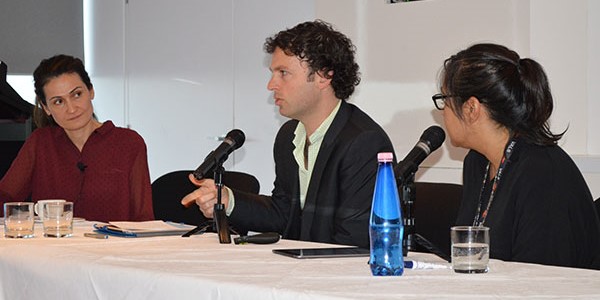Breaking the cycle of Aboriginal over imprisonment
Poverty and disadvantage are the largest drivers behind the over-representation of Aboriginal and Torres Strait Islander in imprisonment rates across Australia.

Facilitator Patricia Karvelas, Melbourne Law School alumnus and Human Rights Law Centre's Ben Schokman, and Victorian Aboriginal Legal Services' Meena Singh
That is the consensus following a lunchtime discussion today featuring Human Rights Law Centre Director of International Advocacy and Melbourne Law School alumnus Ben Schokman and Victorian Aboriginal Legal Services' Meena Singh.
Lawyers, solicitors, graduates and others from the legal fraternity attended the sold out discussion, held at King & Wood Mallesons in Bourke Street, Melbourne, where shocking statistics showing Victorian Aboriginals are 13-times more likely to be imprisoned than their non-Aboriginal peers were put under scrutiny.
The statistics revealed Victoria had recorded the second-largest increase in Aboriginal imprisonment rates in the past 12 months, with Victorian Aboriginal women now 34-times more likely to be jailed than non-Aboriginal women in this state.
"It is getting worse," Ms Singh said.
"There seems to be a sense of 'us and them'."
Both Mr Schokman and Ms Singh agreed the lasting impact of colonisation on Aboriginal over-representation needed to be examined in an effort to curb the imprisonment rates and the flow-on effects to support services and communities.
Mr Schokman touched on HRLC's new ground-breaking 12-point blueprint that aims to address the issues facing Aboriginal and Torres Strait Islanders, such as the causes behind their imprisonment rather than the crimes they commit.
"How do we build communities and not build prisons?" Mr Schokman said.
"If you look at any strong community and the elements of that community…all of those elements exist in Aboriginal communities but the space to facilitate that and to allow it to come out is not there."
"There is no lack of goodwill or money, just the resources."
A focus of the discussion was on government funding towards various services within indigenous communities, and the need for a holistic approach in providing economic sustainability.
Ms Singh said there was a need for greater dialogue between communities and government to use the knowledge of previous funding efforts in a better capacity moving forward.
"There is a real disconnect between what the issues on the ground are and who is holding the purse strings," she said.
Her panel counterpart acknowledged that from a justice perspective, the "flurry of innovation" had faltered.
"It is not rocket science," Mr Schokman said.
"It is as simple as…we are not happy; we want to do things differently."
Other discussion points included the importance of culture, and statistics showing the rate for re-imprisonment among Aboriginal and Torres Strait Islanders was at 75 per cent, 20 per cent higher than the rest of the population, as revealed by Ms Singh.
"We are not a healthy community across the country if these are the rates of over-imprisonment."
Visit the Human Rights Law Centre website for more information on its work in Indigenous rights.By Andy Walsh n